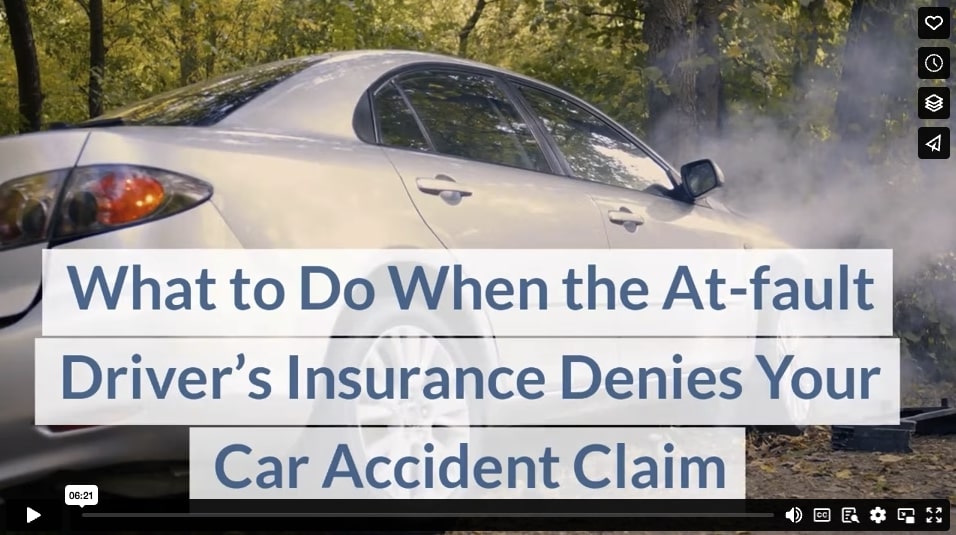It was very obvious to you who was at fault in the accident. The other motorist edged out a little too far onto the road, and there you were barreling straight ahead at 45 mph. You were going the speed limit, but it was like he hadn’t even bothered to look before he lurched into oncoming traffic. There was no time for you to stop, and—BAM!
Now, you are dealing with the consequences of his carelessness. You have a lingering concussion, whiplash, and broken ribs. You lost a few weeks of wages because you were in too much pain to go to work. And your car is totaled.

(Drazen Zigic/Freepik)
You just want to feel better and get compensation from the other party’s insurance company so you can pay the medical bills, get a new car, and move on with life.
But the news hits like a thud…the other party’s insurance company denied your claim. How could this happen? The other motorist was clearly at fault. And how will you ever dig out of this financial hole caused by someone else?
First of all, don’t panic. An insurance denial does not have to shut the book on your case. As our accident attorneys have served the Las Vegas and Henderson areas, they have helped many victims successfully appeal their denied claims and get the compensation they deserve.
Why Did the Insurance Company Deny My Claim?
Sometimes, claims are denied due to technicalities or lack of evidence. Other times, the insurance company may be acting in bad faith and trying to wriggle out of paying your claim.
Here are some of the most common reasons for claim denial:
Lack of an Official Police Report
You should always call the police after an accident, even if the accident was minor. This gives a clear snapshot of what happened during the accident from the point of view of an impartial third party. If there is no police report, the opposing party’s insurance company will make their own assessment based on evidence, but they may not reach the right conclusion.
Police Report Did Not Assign Fault
If there was a police report but it concluded that the fault was “indeterminable,” you will be left with a scenario similar to the one described above. The insurance company will need to conduct their own investigation, and the results may not line up with the actual facts.
Opposing Party Got the Evidence Wrong
When the insurance company does their own investigation, they will take into account their client’s testimony, eyewitness accounts, and photographs of the accident. They may even recreate the accident to determine fault.
These are helpful measures, but they are not foolproof. What if their client changes their story to protect their own interests? Or a witness remembers things incorrectly? The facts of the accident could quickly become distorted.
Insurance Policy Exclusions
There may be some fine print in the insurance policy that includes certain exclusions. For example, a common exclusion is “acts of God,” which refers to natural events that cannot be controlled. If the other driver’s visibility was obstructed due to a sudden hailstorm, for example, they might not be considered at fault.
Insurance Lapse
The insurance company is only responsible for their clients’ actions when their clients are paying their premiums. If they have failed to pay and allowed their insurance to lapse, the insurance company will deny the claim. The claim will then be resolved with your own uninsured motorist coverage.
Insufficient Insurance Coverage
Even if the other motorist has insurance, it may not be enough to fully cover your claim, in which case the claim would default to your underinsured motorist coverage. This type of coverage is not required in Nevada, but you can see how important it is in a situation like this.
Accident Was Reported Too Late
Some policies have cut-off dates for filing claims. If you delayed and missed the due date, the insurance company may deny the claim. That’s why it is critical to report all accidents immediately after they happen.
Insurance Company is Acting in Bad Faith
Sometimes, there is no good reason for a claim denial. The insurance company may be claiming things that aren’t true or denying obvious evidence. They may be impossible to reach or only answer your questions after long delays.
The insurance company has the responsibility to be:
- Fair and honest
- Accessible
- Timely in their responses
If they are falling short on any of these criteria, they are not upholding their legal responsibilities.
How Do I Take Action After My Car Accident Claim Is Denied?
You can start by writing a letter refuting the claim and asking for fair compensation. This is called a demand letter. It should tell your side of the story, including why the other driver (their client) was at fault.
Include evidence to support your side of the story, including the police report (if available), pictures of the accident scene, pictures of the damages to your car, pictures of your injuries, and eyewitness accounts.
You should also include an account of the damages that you have experienced due to the injury. This may include damages to your property and physical health. It may also include damages to your emotional health. For example, if you have anxiety or PTSD due to the accident, include this in your account. Make sure to explain how your injuries (whether physical or emotional) have affected your life, ability to work, relationships, ability to sleep, etc.
You should also present a demand amount, which is the amount that the insurance company should pay to cover your damages. Be very careful when you determine this amount. It should not just include past medical bills if your injuries have not yet healed. The last thing you want is to be stuck paying medical bills into the future for an accident you did not cause.
A skilled auto accident attorney can help you come up with an amount that will anticipate future medical bills commensurate with your injuries and provide comfortable wiggle room for the many inconveniences you have suffered due to the wreck.
They may also help you put a fair price tag on “intangibles” like “pain and suffering.” This term refers to the physical and emotional stresses that aren’t necessarily coordinated with a direct dollar amount but have still degraded your quality of life.
Your demand letter may also include:
- A list of medical expenses (for medical appointments, prescriptions, therapies, etc.). Include copies of receipts if possible.
- A list of property damage expenses (such as car repair bills). Include copies of receipts if possible.
- A list of financial losses due to your injury (such as lost wages).
Be careful with how you word the letter. Don’t use angry or inflammatory language. Don’t admit to any kind of fault in the accident. Be honest but be favorable toward your case.
Do I Need a Car Accident Lawyer to Write My Demand Letter
As a general rule, an insurance company will take a letter from an attorney more seriously. A skilled car wreck attorney will know the right jargon to elevate your claim and nudge the insurance company to fulfill their responsibilities to you. They will also make sure your letter contains the most important statements and evidence to assure that you get the full payment you deserve.
If the insurance company continues to deny your claim, your attorney can fight back with the most compelling legal arguments in your favor. You may be new to the tactics of Big Insurance, but your attorney won’t be. They can see right through these schemes and make sure you get the full compensation you are legally entitled to.
Video

